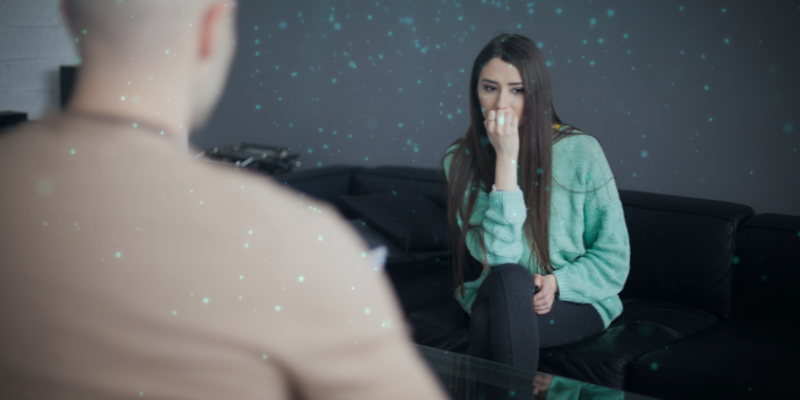
Type 5: Temporal Lobe Anxiety/Depression is related to too little or too much activity in the brain’s temporal lobes (involved in moods, emotions, and memory), in addition to overactivity in the basal ganglia and/or deep limbic system. The temporal lobes are frequently forgotten in psychiatry and rarely talked about in clinical settings (outside of temporal lobe seizure disorders).
Yet the temporal lobes are an amazing part of the brain, personality, and perhaps even religious experience. They are very important to memory, moods, and emotions. When there are problems in this part of the brain, people struggle with temper outbursts, memory problems, mood instability, visual or auditory illusions, and dark or frightening thoughts.
People with this type of anxiety and depression tend to misinterpret comments as negative when they are not, have trouble reading social situations, and appear to have mild paranoia. They may also have episodes of panic or fear for no specific reason, experience frequent periods of déjà vu, and be preoccupied with religious thoughts. People with this type are the most likely to exhibit aggressive behavior toward others or themselves.
People with Type 5: Temporal Lobe Anxiety/Depression are the most likely to exhibit aggressive behavior towards others or themselves. Click To TweetCOMMON SYMPTOMS OF TYPE 5: TEMPORAL LOBE ANXIETY/DEPRESSION
People with this type generally have 4 symptoms from Pure Anxiety (Type 1) and/or Pure Depression (Type 2) in addition to at least 4 “temporal lobe” symptoms.
Anxiety symptoms include:
- Frequent feelings of nervousness or anxiety
- Panic attacks
- Avoidance of people or places due to a fear of having anxiety or panic attacks
- Symptoms of heightened muscle tension (headaches, sore muscles, hand tremor)
- Periods of heart-pounding, nausea, or dizziness
- The tendency to predict the worst
- Multiple persistent fears or phobias (such as dying or doing something crazy)
- Conflict avoidance
- Excessive fear of being judged or scrutinized by others
- Being easily startled or a tendency to freeze in anxiety-provoking or intense situations
- Shyness, timidity, and getting easily embarrassed
- Biting fingernails or picking skin
Depression symptoms include:
- Persistent sad or “empty” mood
- Loss of interest or pleasure in activities that are usually fun, including sex
- Restlessness, irritability, or excessive crying
- Feelings of guilt, worthlessness, helplessness, hopelessness, pessimism
- Sleeping too much or too little, early-morning awakening
- Loss of appetite and/or weight loss, or overeating and weight gain
- Decreased energy fatigue, feeling “slowed down”
- Thoughts of death or suicide, or suicide attempts
- Difficulty concentrating, remembering, or making decisions
- Persistent physical symptoms that do not respond to treatment, such as headaches, digestive disorders, and chronic pain
- Persistent negativity or chronic low self-esteem
- Persistent feeling of dissatisfaction or boredom
Temporal Lobe Symptoms
- Short fuse or periods of extreme irritability
- Periods of rage with little provocation
- Often misinterpreting comments as negative when they are not
- Periods of spaciness or confusion
- Periods of panic and/or fear for no specific reason
- Visual or auditory changes, such as seeing shadows or hearing muffled sounds
- Frequent periods of déjà vu
- Sensitivity or mild paranoia
- Headaches or abdominal pain of uncertain origin
- History of head injury
- Family history of violence or explosiveness
- Dark thoughts that may involve suicidal or homicidal thoughts
- Periods of forgetfulness or memory problems
TYPE 5: TEMPORAL LOBE ANXIETY/DEPRESSION IN THE BRAIN
Brain SPECT imaging findings associated with this type show abnormal activity in the brain’s temporal lobes as well as increased activity in the basal ganglia (see Type 1: Pure Anxiety for more on the basal ganglia) and/or the deep limbic system (see Type 2: Pure Depression for more on the deep limbic system) at rest and during concentration.
- Temporal lobe basics: The temporal lobes are located underneath your temples and behind your eyes. On the dominant side of the brain (the left side for most people), the temporal lobes are intimately involved with understanding and processing language, intermediate- and long-term memory, complex memories, the retrieval of language or words, emotional stability, and visual and auditory processing. The non-dominant temporal lobe (usually the right) is involved with reading facial expressions, processing verbal tones and intonations from others, hearing rhythms, appreciating music, visual learning, and spiritual experiences.
- Temporal lobe problems: When the temporal lobes become less active with concentration, people often struggle with learning problems. When they are less active on the left side, there is a tendency toward reading problems and irritability. When they are less active on the right side, there is a tendency to have trouble reading social situations. It is possible to have decreased activity on both sides.
- Common causes of temporal lobe problems: Temporal lobe abnormalities occur much more frequently than previously recognized. In part, this is because the temporal lobes sit in a vulnerable area of the brain that can be damaged by a blow to the head from almost any angle. SPECT scans show that 40% of patients at Amen Clinics have experienced a brain injury. Temporal lobe problems can also come from many other sources, including genetics, exposure to toxins, and infections.
INTERVENTIONS FOR TYPE 5: TEMPORAL LOBE ANXIETY/DEPRESSION
In traditional psychiatry, the most commonly prescribed antidepressants are selective serotonin reuptake inhibitors (SSRIs). However, decades of research have shown that SSRIs can make some people more aggressive and more suicidal. Based on the world’s largest database of brain SPECT imaging at Amen Clinics—over 160,000 scans and growing—people with temporal lobe abnormalities are at greater risk for a negative reaction to SSRI medication. But if nobody looks at your brain, they would never know that there is abnormal activity in the temporal lobes.
Natural solutions for this type include:
- Diet: Many people with aggressive behavior become much worse after a high sugar load, so eliminate sugar from your diet. When aggressiveness is associated with ruminations, moodiness, and depression, a balanced diet of equal amounts of complex “smart” carbohydrates and protein is likely to be best.
- Supplements: When there is abnormal temporal lobe activity and anxiety, mood instability, or irritability, try GABA, magnesium, theanine, and taurine.
- Psychotherapy and anger management: Since temporal lobe problems are often associated with anger management issues, learning how to deal with negative feelings and impulses is especially important for those vulnerable to them.
- Neurofeedback: This non-invasive therapy allows you to train healthier brain-wave rhythms in the temporal lobes.
- Rhythmic movement: The temporal lobes are involved with processing and producing rhythms. Chanting, dancing, and other forms of rhythmic movement can be healing.
- Listen to classical music: Listening to it can activate and stimulate the temporal lobes and bring peace or excitement to your mind.
- Humming or singing: Humming can make a positive difference in mood and memory. Singing can have a healing effect on your temporal lobes, and probably your limbic system as well.
- Drumming: In a fascinating study in Experimental Brain Research performed during open brain surgery, listening to drumming activated the temporal lobes in 74% of participants. Consider drumming lessons to activate your temporal lobes.
Depression, anxiety, aggression, memory problems, and other mental health issues can’t wait. During these uncertain times, your mental well-being is more important than ever and waiting until life gets back to “normal” is likely to make your symptoms worsen over time.
At Amen Clinics, we’re here for you. We offer in-clinic brain scanning and appointments, as well as mental telehealth, remote clinical evaluations, and video therapy for adults, children, and couples. Find out more by speaking to a specialist today at 888-288-9834 or visit our contact page here.





Thank you sharing such an informational article. The most helpful are the solutions which we can do for ourselves to get recover from this.
Comment by Elissa Thoms — January 4, 2021 @ 4:18 AM
are they doing spec scans at this time.
Comment by Anne Marie Hughes — January 8, 2021 @ 5:09 AM
What are activities that stimulate all the other parts of the brain?
How much fish oil is good to take?
What supplements are good for brain?
Exercise?
What foods are best for the brain?
Thank you
Comment by Linda — January 8, 2021 @ 5:22 AM
Great article! Thanks.
Comment by Timothy Lee — January 8, 2021 @ 5:25 AM
So last year I was diagnosed with Bipolar 1 disorder and I’m on lithium and an antipsychotic. Can either of those medications affect the temporal lobes? I ask because I’ve noticed myself having issues with one term memory storage and it just seems my memory is not what it used to be and I’m only 26. It’s gotten a little better but I still get that feeling that the medications are affecting my brain both positively and negatively.
Comment by Luke — January 8, 2021 @ 7:00 AM
Hello Anne Marie, thank you for reaching out. Yes, all 9 of our clinics (https://amenclinics.com/locations/) are performing brain SPECT scans on patients. We are following all COVID safety procedures: https://amenclinics.com/covid-19-safety-practices-and-procedures/. For questions about appointments, please contact our Care Coordinators: https://amenclinics.com/schedule-visit/.
Comment by Amen Clinics — January 8, 2021 @ 8:10 AM
about 12 yrs ago i started in temperomandibular joint treatment by a dentist
it brought out a long abiding memory i had as a child of crashing the back of my head on a concrete path whilst swinging, twisting my sphenoid, and apart from physical problems culminating in ovarian cancer from the impeded sphenoid and reproductive system, i have spent my life wrestling with the above problems – anxiety, depression, paranoa and difficulty with interacting with other humans – although my parents gave me excellent boundaries to work within.
it has been a long old treatment and still not finished but it has made me realise how magic the human body and mind is
thank you for your confirming emails on the struggles us humans have
Comment by penny waters — January 8, 2021 @ 8:10 AM
For *years* I’ve been telling people that I require “loud music therapy,” because regularly going to dance clubs would honestly clear my mind and make me feel better over time. This pandemic has really deprived me of that. I don’t have a loud, bass-heavy sound system that can fix me at home. My point is that this article validates my theory.
Comment by Sarah — January 8, 2021 @ 9:35 AM
My husband has been recently diagnosed with dementia. (Possibly Frontotemporal dementia.) His vision is pretty bad and he cannot read any of your material because of it. Do you have any material with large print? He just tried to look at your Memory Rescue book but cannot read it. I guess I will probably have to read it out loud to him.
Comment by Kathryn Hodges — January 8, 2021 @ 12:24 PM
This article was so informative & interesting me because I was diagnosed with Temporal Epilepsy in 1981 at the age of 32 & Bi polar Disease in 2008. I’m now 71 & anxious to get a spect gram at your clinic
Comment by Gail — January 8, 2021 @ 11:00 PM
Looking for a neurologist in my area that can perform a bran scan on me and husband. Husband has MS and I have noticed memory lost for years. Lynwood. IL.
Comment by Ayesha Muhammad — January 9, 2021 @ 4:31 AM
Excellent article on a subject that is not readily known. Very helpful 🙂
Thank you
Comment by Toni — January 9, 2021 @ 5:36 AM
My wife died in 2005 from Ovarian Cancer. I know the fear. I hope you are well. I had temporomandibular pain that came and went for no apparent reason for years. Since adopting a wheat free diet (gluten free), in 2014, it has not returned. Being gluten free has also cured many other health issues I had. Among them: enlarged prostate, sleep apnea, protein buildup on my contacts, stopped progression of cataracts, plantar fasciitis, I was a mouth breather my entire life; now my sinuses are clear, and a host of other complaints. Avoid synthetic vitamin A, E and Folic Acid (Folate good, Folic Acid not so good). Eat a diet high in potassium (RDA=4,700 grams/day), most of the essential vitamins and minerals will be included in those foods at around 2000 calories. 2 oz almonds has 440 mg potassium and 15.4 mg vitamin E (100% RDA) for 350 calories. Look for foods with 2.4 gram potassium/calorie and more potassium than salt on labels. Dr. Amen’s diet advice is good.
Comment by Paul Mammen — January 10, 2021 @ 12:07 PM
Hello Ayesha, thank you for reaching out. At this time, we have 9 clinic locations and one of them is in Bannockburn, IL: https://amenclinics.com/locations/chicago-metro-area/. If this clinic is not reachable for you, please contact our Care Coordinators for additional resources and referrals: https://amenclinics.com/schedule-visit/.
Comment by Amen Clinics — January 11, 2021 @ 7:42 PM
interesting article!
Comment by Doug Morris — December 6, 2023 @ 8:28 PM